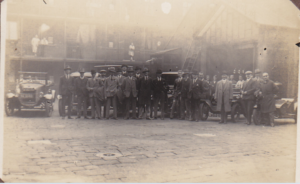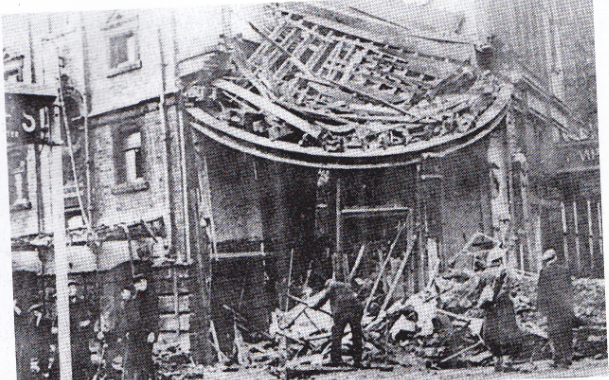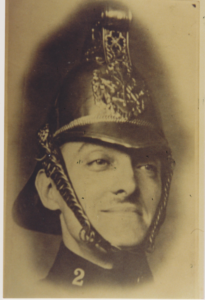South Yorkshire’s fire service is highlighting the story of a firefighting hero killed during the Sheffield Blitz- exactly 80 years after the events which took his life.
Frederick Parkes Spencer was the only permanent, full time Police Fireman – as they were then known – to have been killed when thousands of tons of explosives were dropped on Sheffield on the night of 12 and 13 December 1940.
South Yorkshire Fire & Rescue has already honoured Frederick by naming one of the conference rooms at its Eyre Street headquarters in his memory.

The room is just a stone’s throw from where Frederick lost his life on Charles Street, when the Empire Theatre received a direct hit from a German bomb.
One of his relatives, Anne Whiteley, has been researching the story of her mum’s cousin.
Anne said: “The night of the Blitz- a Thursday evening, 12 of December- had been half day closing, so Sheffield was busy, as it had always been a popular night for going out to the clubs, theatres, cinemas and dance halls. At the City Hall a dance was in progress. The entertainment at The Empire Theatre that evening was Henry Hall and his Orchestra”.
“The `take cover` warning was sounded at 7pm and enemy planes were soon overhead, attacking the city centre. Stationed and living at the service headquarters at Division Street, Frederick Parkes Spencer was on active duty that night, with all his colleagues”.
“Crews from Division Street, reinforced by part-time crews from Sheffield`s auxiliary fire stations were quickly in the city centre, and were attending the fires caused by the first wave of `marker` incendiaries when the second wave of enemy bombers arrived.”

Over 500 telephone calls were received at the Fire Station Control Room. At 12.42 am on 13th December, Sheffield Police Fire Brigade requested assistance from Sheffield Transport Department and neighbouring fire brigades. In response, 50 pumps were sent from as far away as Birmingham, Manchester and York. Pumps also arrived from 20 towns.
The outside help eventually extended to over 70 pumps and 522 men. The most intense bombardment was between 10.30pm and 2.15am on 12 and 13 December, continuing for a total of nine hours.
Codenamed Operation Crucible by the Germans, these raids saw hundreds of Heinkel 111, Dornier 17 and Junker 88 drop many thousands of tons of explosives on Sheffield. Mains water supplies ran out quite quickly and needed to be relayed from public baths and even the river Don.
The Empire Theatre on Charles Street was hit by a bomb, and had received severe structural damage, was on fire, and in danger of collapse. Frederick was entering the theatre to try to check and clear the building of persons remaining inside, but he and Auxiliary Fireman Stanley Slack, age 29, who lived at Hermitage Street, Moorfoot, both died at the scene.

Anne said: “Frederick was 36 years old and the only permanent and full-time Police Fireman to die in the Blitz. Police Firemen had powers to arrest offenders and jail them if necessary, hence the cells which can still be seen at the National Emergency Services Museum, in Sheffield”.
“Frederick’s parents, and younger brother, Jack, were living at Bradway Road at the time. Jack Spencer, on leave from the Navy in Singapore, was only able to identify him from his brass helmet and the number `2` on his uniform, as he was so badly injured. This helmet and his posthumous award for bravery were later donated by Jack, and put on display at The National Emergency Services Museum”.
“However, Edna, his wife, had to vacate their flat at the Division Street headquarters and return to live with her parents close to Woodhouse cemetery where she buried Frederick, his headstone simply stating `died as a result of enemy action`. Sheffield City Council Watch Committee of 19 December 1940 awarded her a pension of £78pa under the provisions of The Police Pensions Act 1921 and The Police and Fireman War Service Act 1939.”
Chief Fire Officer Alex Johnson, said: “As the events of World War II begin to fade from living memory, we believe it’s even more important than ever to tell the stories of people like Frederick Parkes Spencer and all the other men and women who lost their lives trying to protect Sheffield, its buildings and its people.”
Following The Sheffield Blitz further raids were mounted by The Luftwaffe. However, none of them matched the intensity and loss of life that occurred on 12/13 and 15 December 1940.
You can find out more about the contribution of the work of firefighters during the Sheffield Blitz by searching The Sheffield Fire Brigade website edited by Edward Mullins, and visiting the National Emergency Services Museum on West Bar in the city.
